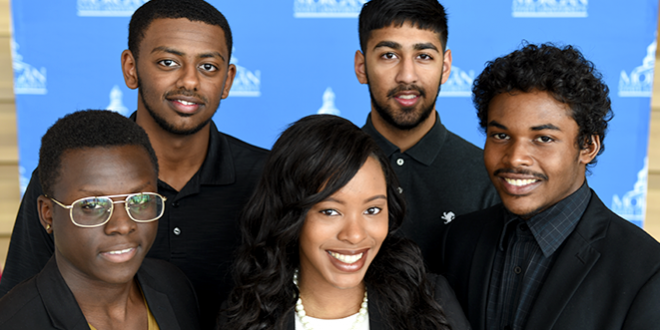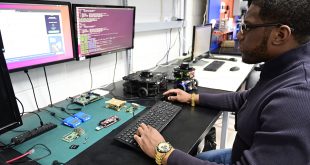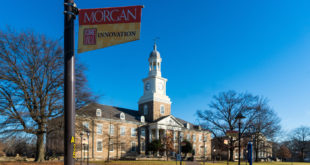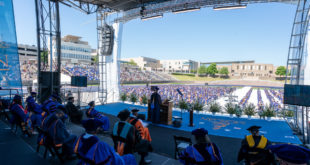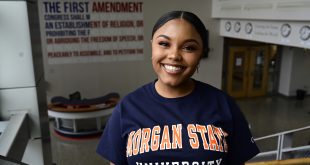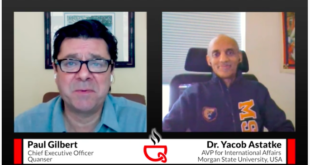After completing a rigorous six-week training, five Morgan State University students were named as University Innovation Fellows by the National Center for Engineering Pathways to Innovation (Epicenter). The five students, Morgan’s “Leadership Circle,” are among 150 select students from 52 institutions of higher education nationwide. Morgan was one of only two Maryland universities to have students named as Fellows for this academic year.
The program empowers its Fellows to become agents of change at their universities. The Fellows work to ensure that their classmates and peers gain the necessary knowledge, skills and attitudes required to compete in today’s economy and have a positive impact on the world: goals that dovetail with Morgan’s own call for growing the future and leading the world.
The students in Morgan’s Leadership Circle are sophomores Mareco Edwards II (Accounting) and Iyanna Patterson (Business Administration), along with juniors Ravin Jajistar (Electrical and Computer Engineering), Abdoul Mohammed (Transportation Systems Engineering) and Michael Shiferaw (Electrical and Computer Engineering). The newly named Fellows join Morgan’s previous designates Adrien Feudjio, who is a senior studying electrical engineering, and recent graduate Jaime Arribas Starkey-El, who earned his bachelor’s degree from Morgan in physics and engineering physics. This brings to seven the number of Morgan students who have received the distinction.
Mary K. Foster, Ph.D., an assistant professor in Morgan’s Earl G. Graves School of Business and Management, serves as the group’s faculty sponsor.
 “According to students who have become Fellows, this is a transformative experience,” says Foster “Being able to meet students from other campuses across the country and to learn state-of-the-art innovation skills changes their thinking and opens doors to possibilities they had never considered.”
“According to students who have become Fellows, this is a transformative experience,” says Foster “Being able to meet students from other campuses across the country and to learn state-of-the-art innovation skills changes their thinking and opens doors to possibilities they had never considered.”
Applications for the program are accepted in the fall (September/October) and spring (April/May). Only sophomores or juniors are eligible to apply. If an applicant is accepted, he or she must complete six weeks of training, which usually requires about six to 10 hours of work per week. Once candidates complete the training, they may be pinned as Fellows. Fellows earn an all-expense-paid trip to Silicon Valley, where they visit Stanford University, which is the home of the program, and industry campuses including Google.
During the academic year, Fellows participate in events and conferences around the country and have opportunities to learn from one another, as well as their Epicenter mentors and leaders in academia and the business community. Armed with these resources, their charge will be to lead change at their academic institutions and help develop a culture of innovation. Last year’s class of Fellows held 112 events and established 35 “spaces” at their schools.
“Spaces” refers to places on campus where a Fellow’s innovation and/or improvement is manifested and can be utilized by all students. The first project of Morgan’s Leadership Circle is to develop a “Communications Gathering Space” on campus, where students can exchange ideas with each other or easily distribute student-generated communications throughout the Morgan community. Previous Fellow Adrien Feudjio’s project involved the development of an app named “Morgan Konnect.”
“We’ve trained more than 450 students at 130 institutions in the last four years,” according to Humera Fasihuddin, co-leader of the University Innovation Fellows program. “Faculty and administrators are funding a consistent supply of students to go through the program because they can count on Fellows to make a big impact. Fellows understand the big picture and use their resourcefulness, creativity and national network to make measurable gains on campus, both in the number of resources and the students served by the innovation and entrepreneurship ecosystem.”
The University Innovation Fellows program is operated by Epicenter, whose primary mission is to empower U.S. undergraduate engineering students to bring their ideas to life for the benefit of our economy and society. Stanford University and VentureWell direct the program while the National Science Foundation provides funding. Individual Fellows or institutional teams of Fellows are sponsored by their own university’s faculty and administrators.
 Added Dr. Foster, “We are very thankful for the support that we received from Dr. Gloria Gibson, provost and senior vice president for Academic Affairs, and Dr. Fikru Boghossian, dean of the School of Business and Management. As a result of their efforts, Morgan’s participation in this program has grown from a single student in 2013 to 12 expected Fellows by the end of the current academic year.”
Added Dr. Foster, “We are very thankful for the support that we received from Dr. Gloria Gibson, provost and senior vice president for Academic Affairs, and Dr. Fikru Boghossian, dean of the School of Business and Management. As a result of their efforts, Morgan’s participation in this program has grown from a single student in 2013 to 12 expected Fellows by the end of the current academic year.”
The University is looking forward to building on this success and expanding the number of Morganites to earn the distinction of University Innovation Fellows.
To learn more about Morgan’s involvement in the program and the students’ strategic priorities, visit: http://universityinnovation.org/wiki/Morgan_State_University_Student_Priorities.
 Morgan State University Newsroom Morgan State University
Morgan State University Newsroom Morgan State University
